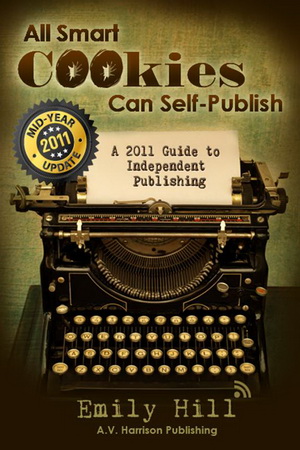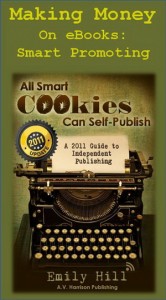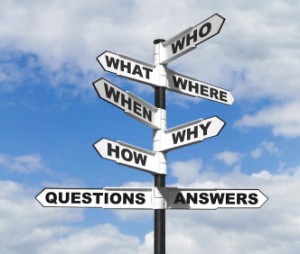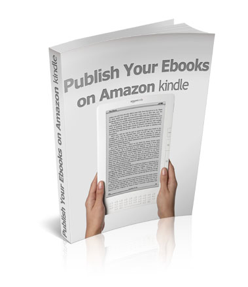WRITERS. How do you price an e-book? That’s a hot topic now that more and more independent authors are competing with legacy publishers. Everyone is trying to find the correct price points for fiction and non-fiction e-books in a market that Forrester Research expects to grow from $169 million in 2009 to almost $3 billion by the middle of this decade.

In a recent press release, self-publishing coach and advocate Emily Hill shared her thoughts about e-book pricing for fiction and non-fiction e-books.
Pricing Fiction E-Books
“Except for the insatiable demand for paranormal/action stories, the fiction market is totally and completely glutted. This includes romance, westerns, young adult, and historical fiction,” states Hill. She believes e-book pricing for fiction comes down to three factors: (1) market demand; (2) the author’s emotional comfort zone; and (3) trial and error.
As fiction authors have flooded the market, Hill notes that readers must now do the job that used to belong exclusively to agents—separate the well-written manuscripts from the ones that just aren’t very good.
To get the attention of book buyers in today’s crowded marketplace, some first-time authors have resorted to giving their e-books for free—hoping to lay the foundation for future book sales.
Hill believes offering free fiction books can be a mistake: “Authors who give away their e-books and then loudly tout their ratings are frauds in my opinion. They either lack confidence in their work, don’t want to devise a marketing plan, or haven’t made friends with their fan base.” She emphasizes that, “If you are doing commercial writing (writing to make money), you should be writing to your fan base, and writing what they want to read.”
When she recently examined how the ten best-selling fiction titles for Kindle were priced, Hill found prices ranging from $0.99 to $12.99. Six of the best-selling titles were from one of the “Big Six” legacy publishers, and four were from independent publishers. The average price of e-books published by legacy publishers was $9.09, compared to either $0.99 or $2.99 for the fiction from independent publishers.
Because this sample of ten was so small, Hill consulted authors she regards as mentors for her own publishing efforts. Dean Wesley Smith advises charging $2.99 for short novels, $4.99 for a short-story collection, and $4.99 for standard-length novels. Tony Elridge suggests pricing e-books at $2.99, then using ‘book bundling’ to sell sets of titles at a higher price.
Nathan Bransford has noticed that the price of e-books have dropped dramatically over the period from June 2010 to June 2011. He has observed that when presented with two titles in the reader’s preferred genre, a reader will hit “Buy Now!” on the cheaper title, even if that title has been written by a lesser-known author, or even an unknown author or bad writer.
Best-selling independent author John Locke prices all of his e-book fiction titles at $0.99.His non-fiction book, “How I Sold 1 Million Books in Five Months,” is priced at $4.99.
Pricing Non-Fiction Books
When Hill scanned the list of 100 best-selling non-fiction titles in the Kindle Store earlier this month, the most expensive non-fiction title was priced at $7.00 and six of the top sellers were sex-related. But the Kindle Store list changes often. The top-ten best-sellers listed today (Aug. 30) range in price from $7.16 for “Jesus Calling” by Sarah Young to $13.17 for “Guerilla Marketing for Job Hunters 3.0” by Jay Conrad Levinson and David E. Perry.
While it’s important to price your e-book competitively, Hill urges authors not to overlook the other vital elements of book publishing and promotion. Success still requires good writing, a unique story, impeccable grammar and sentence structure, and sharp marketing. She advises writing the best book possible, and marketing it to a fan base you have already established.
Why Independent Publishing Is Growing
Emily Hill is an outspoken advocate of self-publishing and isn’t surprised that the IndiePub movement is exploding. Considering that less than 1% of emerging author’s manuscripts are selected for publication, she wonders “Why would those in the 99% agent-rejected category put themselves through the dreaded query process in the first place?” Hill believes the tough economy and diminished bookstore space caused by the closure of bookstores has made independent publishing the only alternative for most authors.
In addition to offering coaching and consulting services to independent authors, Emily Hill has written two e-books on self-publishing.
 “All Smart Cookies Can Self Publish” details the current landscape of the publishing industry and outlines steps necessary to publish and market books on your own. Priced at $3.95, the e-book provides practical advice such as how to insert linked-live Tables of Contents in your e-books and how to push the marketing of your e-books by embedding links to your Amazon and Barnes & Noble pages.
“All Smart Cookies Can Self Publish” details the current landscape of the publishing industry and outlines steps necessary to publish and market books on your own. Priced at $3.95, the e-book provides practical advice such as how to insert linked-live Tables of Contents in your e-books and how to push the marketing of your e-books by embedding links to your Amazon and Barnes & Noble pages.
Hill just announced a new addition to her “All Smart Cookies” series, entitled “Making Money on eBooks: Smart Promoting.” The book features insights Hill has gained from teaching self-publishing workshops over the past two years: “You’ll learn how easy—and fun—it can be to make money by self-publishing your tips, insights, memoirs, and how-to guides.”
“Making Money on eBooks: Smart Promoting” sells for $2.99 and includes tips on marketing, promoting, and connecting your titles to the correct audience.
LINKS
E-Book: All Smart Cookies Can Self-Publish by Emily Hill
E-Book: Making Money on eBooks: Smart Promoting by Emily Hill
L.A. Times: E-book Sales Headed for $1 Billion


